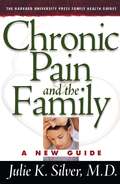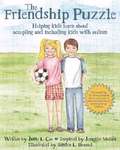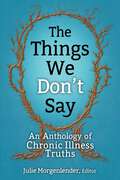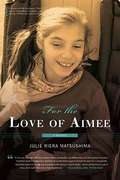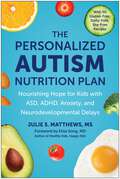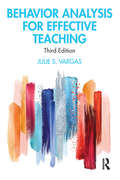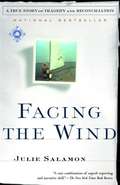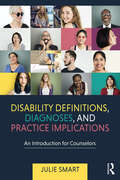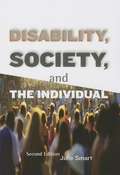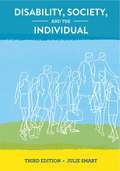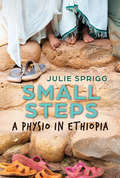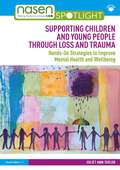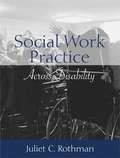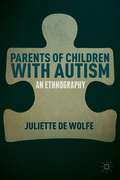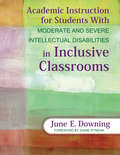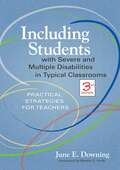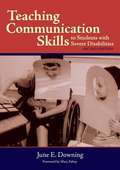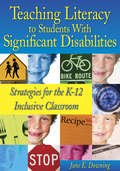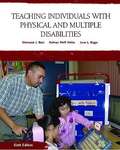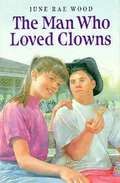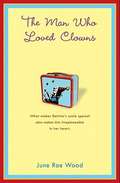- Table View
- List View
Chronic Pain and the Family: A New Guide (The Harvard University Press Family Health Guides #1)
by Julie K. SilverChronic pain is the leading cause of disability in the United States, affecting as many as 48 million people in this country alone. It can demoralize and depress both patient and family, especially when there is no effective pain control and no hope for relief. Improperly managed, chronic pain can lead to substance abuse (usually painkillers) and to acute psychological and emotional distress. Pain begets stress and stress begets pain in a wretched downward spiral. Silver reviews the causes and characteristics of chronic pain and explores its impact on individual family relationships and on the extended family, covering such issues as employment, parenting, childbearing and inheritance, and emotional health. Silver treats aspects of chronic pain not covered in a typical office visit: how men and women differ in their experience of chronic pain, the effect of chronic pain on a toddler's behavior or an older child's performance in school, the risks of dependence on and addiction to pain medications, and practical ways for relatives beyond the immediate family circle to offer help and support to the person in pain.
Special Education Advocacy
by Ruth Colker Julie K. WaterstoneAn edition that uses the advocacy approach to develop a set of materials of teaching children in the special education sector. This book presents the major principles to successful advocacy on behalf of special needs children by using meaningful real life experience.
The Friendship Puzzle: Helping Kids Learn About Accepting and Including Kids with Autism
by Julie L. CoeThe world of autism is one that few understand. The condition comes in many forms, and those affected exhibit a wide range of personality traits, some of which make social relations daunting. The Friendship Puzzle helps young readers learn about accepting and including their friends and classmates with autism. Mackenzie Mackabee is going to school at Brook Acres Elementary. Mackenzie loves to make new friends, and she's very excited when she finds out there is a new boy at school named Dylan. But when her attempts at befriending him fail, she goes to her mother for advice. Together they determine to solve this "friendship puzzle." As she sets out to learn how she can be his friend, Mackenzie discovers that friendships come in many different forms. This book is lively, upbeat and sends an encouraging message about the importance of friendship and inclusion. The activity guide makes the book especially useful for educators and parents.
The Things We Don't Say: An Anthology of Chronic Illness Truths
by Julie MorgenlenderChronically ill people don't always talk about it. Until now. Spanning different ages, ethnicities, genders, sexual orientations, and diagnoses, forty-two authors from around the world open up in fifty true stories about their chronic illnesses and their search for answers, poor treatment by doctors, strained relationships with loved ones, self-doubt, and more. They share the warmth of support from family and friends, the triumph of learning coping mechanisms, and finding ways to live their dreams. These stories are honest, raw, and real, and if you have chronic illness, you will find comfort and companionship in these pages. For everyone else, if you have ever wanted to know more about your loved one's experience with chronic illness but didn't want to ask the wrong questions, this book will have some answers, and more importantly lead you to a new-found understanding.
For the Love of Aimee: A Memoir
by Julie Riera MatsushimaA story of a grandmother's sacrifice and devotion to a beautiful baby girl who was diagnosed with massive irreparable brain damage. Aimee was one of the twin grandchildren born to author Julie Riera Matsushima. The author inspires the reader by demonstrating that supportive and involved grandparents can and do make a difference and invites the reader to share in the disappointments, challenges and amazing accomplishments Julie and Aimee experience together during Aimee's first ten years.
The Personalized Autism Nutrition Plan: Nourishing Hope for Kids with ASD, ADHD, Anxiety, and Neurodevelopmental Delays
by Julie S. MatthewsCreate the right diet to support your child with autism or other neurodevelopmental delays through this step-by-step guide to optimal nutrition for their unique needs.If your child with autism spectrum disorder struggles with common symptoms such as irritability, anxiety, stimming, or gastrointestinal upset, you are not alone—and you are not powerless to help. This groundbreaking book offers the first personalized approach to help improve these disruptive symptoms through your child&’s diet, supplying you with the information and resources you need to holistically help them thrive. Certified nutrition consultant Julie Matthews pairs more than 20 years of clinical experience with practical advice and an attainable and adaptable 12-step plan for effectively addressing the symptoms of autism spectrum disorder, ADHD, ADD, Tourette&’s syndrome, Down syndrome, learning delays, anxiety, aggression, and defiant disorders. Matthews illustrates the underlying biochemical factors that cause these symptoms, and explains how therapeutic diets and nutritional supplements can have profound benefits for your child&’s body and brain. This scientifically proven program includes: Common and impactful diets to implement Adjustable daily meal plan ideas for each diet Detailed lists of key foods and nutritional supplements 50 nourishing and picky eater–approved recipes Symptom questionnaires for determining the right diet Just as every child with autism spectrum disorder is unique, there is no one-size-fits-all diet recommendation. The Personalized Autism Nutrition Plan is tailored yet flexible, empowering you with tools to drastically improve your child&’s well-being and help them thrive—with food as medicine.
Behavior Analysis for Effective Teaching
by Julie S. VargasBehavior Analysis for Effective Teaching is a clear, comprehensive book on the integration of non-aversive behavior analysis principles into classrooms and other school settings. Carefully revised and updated throughout, this third edition includes new content on precision teaching and a new chapter on how teachers can provide appropriate education for students with special disabilities who are included in their classrooms. Focused on merging behavior management with effective student instruction and illustrated with examples from real teachers’ experiences, the book is an ideal primary resource for undergraduate and graduate courses in teacher education, special education, school psychology, and school counseling, as well as for preparation toward the BACB Credentialing Exam.
Facing the Wind: A True Story of Tragedy and Reconciliation
by Julie SalamonIn 1978 Robert Rowe, a Brooklyn attorney, murdered his wife and three children; his 12-year-old son Christopher was blind and had multiple disabilities. Three years earlier Rowe had been diagnosed with psychotic depression. He was acquitted of the murders on the insanity plea. After two years in a psychiatric hospital he was released and set out to build a new life. Salamon bases her book on extensive interviews with the people who knew Rowe and his family. Key among them are the members of a support group for mothers of blind children. The attitudes of the mothers, as conveyed by Salamon, are highly negative toward blind people, and the children are consistently portrayed as burdensome to their parents. On the plus side, the book raises probing questions about the nature of guilt and atonement, sanity and madness, and the meaning of forgiveness.
Disability Definitions, Diagnoses, and Practice Implications: An Introduction for Counselors
by Julie Smart<p>This introductory text defines and describes disability, while providing concrete practice guidelines and recommendations for students in the fields of counseling, social work, and the helping professions. Various specialty areas are explored in detail, including marriage and family counseling, adolescent counseling, addictions counseling, LGBTQ concerns, multicultural counseling, and career counseling. <p>The first three chapters lay the foundations by discussing the demand for counseling services by individuals with all types of disabilities; presenting clinical, legal, medical/biological, and personal definitions of disability; and describing physical, cognitive, and psychiatric disabilities. Next, author Julie Smart examines core beliefs about disability using a range of first-person accounts from experienced counselors. The last six chapters focus on practice guidelines for various aspects of disability—including ethical considerations, societal issues, social role demands, and individual responses—and consider new possibilities for disability counseling professions. <p>With rich case studies woven throughout, as well as valuable information on client needs, disability categorizations, and key Models of Disability, this essential textbook will be useful not only to counseling students but also to professional counselors, social workers, and psychologists.</p>
Disability, Society and the Individual (2nd Edition)
by Julie SmartThe purpose of this book is to look at the disability experience from the perspective of the individual who has a disability, to discuss how disabilities are viewed by society, and to consider the relationship between these two viewpoints.
Disability, Society, and the Individual
by Julie SmartThis is a textbook in a graduate rehabilitation counseling program. It is for a class called psycho-social aspects of disability
Disability, Society, and the Individual
by Julie SmartThis unique book provides a comprehensive examination of the disability experience. The content focuses on definitions of disability, societal response to people with disabilities, and the experience of disability from the perspectives of individuals with disability. It is organized around broad themes rather than disability categories. With an engaging writing style and extensive and completely updated references, Disability, Society, and the Individual-Third Edition prepares the reader to understand and be able to use complex, important, and new ideas surrounding disability -- its experience and social and cultural context. The text includes discussion questions, learning activities, suggested readings, and first-person accounts. PART I--Definitions of Disability PART II--Society and Disability PART III--The Individual and Disability
Small Steps: A Physio in Ethiopia
by Julie SpriggThis heartfelt memoir and travel story is about an idealistic young womanforced to confront the limitations of how much difference she can make in acountry rich in culture but stark in its deprivations. Julie Sprigg spent threeyears in Ethiopia, volunteering at a convent clinic and then teaching the firstphysiotherapy cohort to ever graduate from Gondar University. In Ethiopiashe falls in love, and learns as much about herself as she does about thiscomplex, magnificent country and its people.
Supporting Children and Young People Through Loss and Trauma: Hands-On Strategies to Improve Mental Health and Wellbeing (nasen spotlight)
by Juliet Ann TaylorLoss and trauma impacts families, communities and children and young people. This includes "collective trauma" experienced within situations such as a global pandemic, economic poverty, displacement, war, natural hazards or political turmoil. As a result, various common characteristics may be exhibited by children in school settings.This practical book provides strategies and interventions to support the effects of loss and trauma in children and young people. It offers easy-to-understand research and theory to develop knowledge and skills, alongside hands-on strategies to support emotional responses, with practical examples of "what to do if…." Chapters consider why and how these emotions occur, recognising each child's life experiences, and focus on identifying suitable approaches. The intention is to validate feelings and help each child find a way to navigate the variety of emotions experienced, using the simple "5S-Scaffold" model: SUBSIDE–SOOTHE–SUPPORT–STRENGTHEN–SELF-CARE.With a wealth of information and additional downloadable resources, Supporting Young People Through Loss and Trauma is essential reading for teachers, senior leaders, mental health or behaviour leads and SENDCos.
Social Work Practice across Disability
by Juliet C. RothmanThis book will help prepare the reader to work across disabilities by providing knowledge and training grounded within the ecological framework in four principal areas. The four principal areas reader will be trained in are: the societal environment and disability; disability and the individual experience; essential skills for social work micro, mezzo, and macro practice with people with disabilities; and the resource and support network for persons with disabilities. The book is organized around four units, each of which addresses one of the areas noted. It is not the purpose of this book to enable the reader to gain expertise in any one disabling condition or impairment. Rather, the goal is to provide a broad base of knowledge and skills, which will enable the reader to work effectively across a variety of disabling conditions.
Parents of Children with Autism
by Juliette De WolfeIn a readable and highly accessible ethnographic account that is shaped by the stories of families and the voices of parents, De Wolfe examines how parents of children with autism navigate the educational and medical systems, understand their own and their children's bodies, and support and educate one another.
Daniel Kish: A Different Way to See (Fountas & Pinnell Classroom, Guided Reading)
by Julius SmithersonNIMAC-sourced textbook. CHANGING IDEAS ABOUT BLIND PEOPLE. Daniel Kish is blind, but he learned how to see things around him. Now he's teaching blind children how to see too.
Alexander Graham Bell, Teacher of the Deaf
by Juna LochAlexander Graham Bell, Teacher of the Deaf by Juna Loch
Academic Instruction for Students With Moderate and Severe Intellectual Disabilities in Inclusive Classrooms
by June E. DowningA useful resource for all educational teams who plan for students with moderate and severe intellectual disabilities. In each chapter Downing summarizes current, key research and offers practical applications from her wealth of experience in schools. Readers who are new to planning for students with severe disabilities will find excellent coverage of the basics like systematic instruction, positive behavior support, and collaboration. Professionals with extensive experience will benefit from the new ideas for planning, including specific examples of adapting academic content, considering both family goals and state standards in planning, and using universal design for learning.
Including Students with Severe and Multiple Disabilities in Typical Classrooms: Practical Strategies for Teachers
by June E. Downing Martha E. SnellThe bestselling resource from the most trusted name in special education gets a top-to-bottom update in this new third edition. Revised to reflect the realities of today's K-12 classrooms, this book gives teachers all the latest research-based, practical strategies for fully including students with sensory impairments and cognitive and physical disabilities.
Teaching Communication Skills to Students with Severe Disabilities
by June E. DowningLearners with severe disabilities frequently encounter two problems: they have difficulty in the classroom giving and receiving responses appropriate to their needs, and they are confronted by instructors and aides whose insufficient expertise and discomfort causes negative classroom experiences for all involved. Writing for both in-service and pre-service teachers, Downing (special education, California State U., Northridge) provides strategies they can use to develop confidence in their skills as assessors of communication skills and needs and providers of instruction geared toward the needs of learners. She and her contributors give systematic advice about preparing a good learning environment, teaching in an inclusive classroom, meeting students where they are in their communication, and working in teams to bridge gaps in knowledge and experience. Annotation ©2005 Book News, Inc., Portland, OR (booknews.com)
Teaching Literacy to Students With Significant Disabilities: Strategies for the K-12 Inclusive Classroom
by June E. DowningBreak down the barriers to successful literacy instruction and empower students with special needs with these insightful tips, tools, and examples.
Teaching Individuals With Physical and Multiple Disabilities (Sixth Edition)
by Sherwood J. Best Kathryn Wolff Heller June L. BiggeComprehensive and unique, this text provides special educators and others education professionals with the knowledge and strategies for creating meaningful educational experiences for students with physical, health, or multiple disabilities. It is the only text published that specifically addresses the educational and psychosocial needs of students with physical or health impairments who do not necessarily have cognitive disabilities and explains the psychosocial impact of disability including those disabilities that are degenerative and terminal in nature. It teaches key knowledge and strategies for creating meaningful educational experiences for students with physical, health, or multiple disabilities and illustrates how assessment and curriculum accommodations and modifications support students with physical or multiple disabilities to reach their highest potential. New to this Edition! NEW! Features a completely redesigned model for planning and designing courses of study for students with disabilities that is aligned with core academic curriculum - found in the chapter on curricular options (Ch. 5) and modeled throughout the text. Familiarizes readers with the theory on which text coverage is based and gives them a structure on which to "hang" current and future knowledge. NEW! Includes the most updated information on federal legislation - Summarizes the key aspects of NCLB and IDEA (Ch. 1) Describes mandated assessment and appropriate accommodations and modifications. NEW! Redesigned transition content (Ch. 12) - emphasizes self-determination as a guiding factor developing student outcomes. NEW! Photos and illustrations throughout the text - Created specifically for this text, with enhanced chapter opening photos. Enhance the narrative throughout and the uniqueness of the text overall. NEW! For faculty an Instructor's Manual is now available - to help structure their course and make the content more meaningful to their students.
The Man Who Loved Clowns
by June Rae WoodThirteen-year-old Delrita, whose unhappy life has caused her to hide from the world, loves her uncle Punky but sometimes feels ashamed of his behavior because he has Down's syndrome.
The Man Who Loved Clowns
by June Rae WoodDelrita likes being invisible. If no one notices her, then no one willnotice her uncle Punky either. Punky is a grown man with a child's mind. Delrita loves him dearly and can't stand people making fun of his Down's syndrome. But when tragedy strikes, Delrita's quiet life—and Punky's—are disrupted forever. Can she finally learn to trust others, for her own sake and Punky's? This story captures the joy and sorrow that come when we open our hearts to love. .
